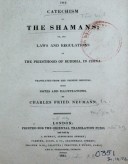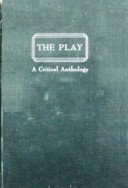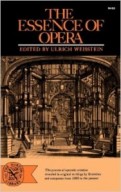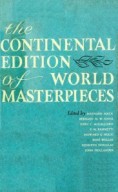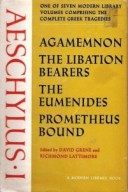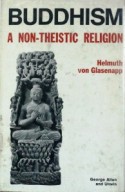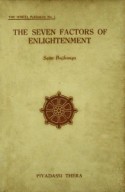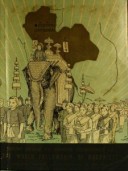Tìm Sách
Sách tiếng Anh-English >> The Shamans
Thông tin tra cứu
- Tên sách : The Shamans
- Tác giả : Charles Fried Neumann
- Dịch giả : Charles Fried Neumann
- Ngôn ngữ : Anh
- Số trang : 152
- Nhà xuất bản : The Oriental Translation Fund-London
- Năm xuất bản : 1831
- Phân loại : Sách tiếng Anh-English
- MCB : 1210000003778
- OPAC :
- Tóm tắt :
PREFACE
The Translator of the following Catechism having lately visited Canton, was fortunate enough to procure a large Buddhist library; the greater part printed at the monastery, opposite to the European factories. This library consists of about three hundred large volumes, and is divided into numerous books: including all the sacred works translated from, and bound up like Sanscrit manuscripts: also the most valuable original publications of the Buddhists in China, and all their liturgical works. The Chinese philosophers and literati are quite correct, when they complain, that human life is not long enough to study the works of Shakiamuny and his followers. “What an easy task, is it not” (says one of them), “to read our classics and philosophers, in comparison to the five or six thousand volumes concerning the doctrine of Buddha !”
In Canton the Author had not time to examine closely his valuable and interesting collection of Buddhistic works; he looked slightly over them, with the view to meet with a treatise in a small size, which would serve as an introduction, or guide in this vast wilderness of Indian physics, ethics, and metaphysics. Perusing many volumes, he at last thought that the following Catechism would be the best adapted to give a tolerable idea of the speculative and practical part of Buddhism; to show more particularly in what form the doctrine of Shakiamuny appears in the middle empire; what customs and superstitions the Buddhists accepted from the Chinese, and in what light they consider the national literature and philosophy of that country. For, it is known, that the Buddhists, like the Jesuits, will readily change their words and. exterior doctrine with the people and the country among whom they reside. This accounts for different superstitions with which Buddhism is mingled in Nepaul, Bootan, Thibet, Mongolia, Ceylon, China, Japan, and in the Indo-Chinese nations, where all was darkness and confusion, before the introduction of Buddhism. History only begins with the missionaries of this doctrine in Siam, Burma and Cambodja. The first kings are said to have come into the former country from Bahar, or Magadha, 543 years B.C., and the chronological tables begin nearly at the same time. So early as the time of Abul Fazel, no traces of Buddhism were to be found in Hindostan, its original birth-place. By the persecution of the Buddhists in their native country, a great part of the literature of India has been lost, and in particular, as Wilson thinks, all the ancient literature of the people speaking Tamul.
The following Commentary on the laws and regulations of Buddha, was compiled by the “Shaman Choo-hung, of the monastery Yun-tse, a follower of the laws of the Bodhisatwas;—and the Shaman Hung-tsan, of the monastery Ting-hooshan, a Bhikshu, whose heart was dedicated to knowledge, Bodhi, wrote the notes.” The work was printed by subscription in the Hainan monastery, opposite to the European factories in Canton, under Kien-lung in the year 1763 of our era. The Translator has selected from the profuse Chinese notes what seemed necessary for understanding the text of the work, and added some of his own. These explanations would have been more copious had they not been written on board ship, and without the assistance of many valuable publications regarding Buddhism. He is particularly sorry that he could not consult some dissertations of M. Rémusat. That celebrated professor of Paris was kind enough to instruct the author in the rudiments of the Chinese language, and for any progress he may have made in the study of so very difficult an idiom, he feels indebted to the strictly grammatical precepts of that learned gentleman. Without the invariable rules of the construction or syntax, a Chinese phrase would signify everything and nothing.
Surely, it is better to inquire in what the various religions and sects of the world, and the philosophers and their schools differ, than to run after similarities between the doctrines of the different ages and climates;—which after all are often only superficial, and show, what every body is aware of, that the speculations of men follow the same laws in every age and in every quarter of the world. Yet there is an uniformity observed in the history of the human race, which puzzles both the most uncultivated and the most acute understanding,—that which exists between the Sanscrit, the Greek, German, and Sclavonic languages; and that similarity which exists both in the doctrine and the ceremonies of Buddhism, and those of Roman Catholicism.
Concerning the uniformity of these languages, it is impossible that chance can have produced it; for there is no law in nature by which the sound of words (being themselves not imitative of a sound), and the grammatical development of speech should be the same; — if there were such a law, all languages must be alike, which certainly is not the case. But the uniformity which exists in the system, and in the ceremonies of Buddhism and Roman Catholicism, may be easier accounted for by the laws of nature. If we suppose an historical connection could exist between these two religions, it becomes a very important question—in what age or century this could have happened? Is it possible that the followers of Buddha —who was born at Kapilapur, in the tenth century before our era—could have adopted their doctrine and their ceremonies from the Nestorians, or from the two or three Catholic monks who travelled over Tartary in the thirteenth of fourteenth century? It is certainly surprising that such an opinion should have been supported by some learned and ingenious men. Is there any difference between Buddhism before and after the thirteenth century? Are the Bodbisatwas, what the word implies, not all Popes; and are not the immediate followers of Buddha called Bodhisatwas;—that is, beings who act by the holy spirit of Buddha and are his vicars on earth? Certain it is, that according to the sentiments of the greater part of the followers of Buddha, every superior in his own district’, like every bishop in his diocese, is a Vicar of the Divinity; and he requires, as it is clearly said in our Catechism, implicit obedience like Buddha himself.
The monarchical government of the Dalai Lama is only respected by that portion of the Buddhists, who received their religion from Thibet, as the inhabitants of Bootan, the Mongolians, and the Manchow: the Chinese followers of Buddha scarcely acknowledge the superiority of the Thibetan Pope. The Buddhistic system was neither formed nor materially changed by the high priest (Dalai Lama) created by the descendents of chingize. The Nestorians could not have brought this monarchical system of the church to Thibet, because they have been its bitterest enemies; and to say that certain friars, who were ignorant both of the customs and of the language of the country, taught the Roman Catholic system to the Buddhists of Asia, would be quite the same as to say, that many ceremonies of the Roman Catholic church were brought to Italy by certain Mahometan captives, who happened to be in that country, in the course of the thirteenth and fourteenth century.
Alexandria has been, as is well known, the great market-place of the world; where not only goods but also opinions and doctrines were often changed and mixed together during the course of the third and fourth century of our era. “The population of Alexandria,” says the celebrated author of the ‘Epicurean,’ “consisted at that time of the most motley miscellany of nations, religions and sects, that had ever been brought together in one city. Beside the school of the Grecian Platonist, was seen the oratory of the cabbalistic Jew; while the church of the Christian stood undisturbed over the crypts of the Egyptian Hierophant.” The influence of the neoplatonic school on the dogmas of the church is obvious, and the similarity between the metaphysics of the Buddhists and Gnostics is equally striking. Mani, the founder of the Manicheism, travelled, as Mirkhond says, far into the east. Being an eclectic, he made his choice from the different religions, and said he was the promised Paraclete, that is, a Bodhisatwa. His whole metaphysical doctrine, his symbolical language, and in particular the division of his follow’ers into lay-men (auditors), and priesthood (Electi), and the different duties prescribed to each of them, seem to be verbally copied from Buddhism. It seems also, by an oath which the followers of Mani must swear before they could be received into the orthodox church,—that they supposed Zoroaster, Buddha, and Christ, one and the same person. Buddhism also was known, as we see by their works, to Clemens of Alexandria and to St. Hieronymus, and a knowledge of this doctrine could not escape a man of the learning and genius of Bardesanes. But in spite of all these copious signs of a connexion between this oriental philosophy and that of the west, there is not the least reason to suppose that the hierarchical system of the Roman Church had been borrowed in the third or fourth century from the Lamas: —we know, too well, the gradual encroachments on the liberty of the church by the bishop and the clergy of Rome.
But, are the ceremonies and the greater part of the Roman Catholic doctrine new institutions,—or are they not rather the old Jewish and Heathenish customs and opinions mingled and confounded together? The learned reader knows the works where he may find what portion of the new Roman doctrine is derived from Judaism, and what part from Paganism. The question regarding the intercourse which might have existed between Rome and Magadha, is therefore the same as the old and puzzling problem regarding the connexion between ancient Egypt and Greece on one part, and lndia and Persia on the other. It is strange that, in our times, learned-and. ingenious men could, against the evidence of the best informed Greeks themselves, deny that Greece received the seeds of its religion and civilization from Egypt and Asia! The mere fact, told by Herodotus and others, that they are indebted to the Pheụicians for their letters, is enough to show that religion and civilization came from foreign countries to Greece. And if the Greeks themselves had not acknowledged this fact, we would be aware of it by comparing the remains of the Phoenician, or rather Babylonian alphabet, with the letters of the most ancient Greek inscriptions. A nation without letters is a nation of barbarians, and a people who bring the art of writing to a foreign place, bring far more than the mere alphabet. Hindoo religion, and the Devanagaii writing, travelled hand in hand over the islands of the Eastern Archipelago, and among the nations on the continent between India and China; the Malays received at the same time the Koran and the Arabic characters; and even in our time, religion, civilization, and letters were introduced at the same period on the Sandwich and on other islands in the Pacific.
It would be presumption to answer such a very difficult question, as that concerning the intercourse between the East and West in those times, which by the historians of ancient Greece are styled the Unknown. It is not only possible, but it seems very probable, that there existed no actual intercourse whatever between Buddhism and Roman Catholicism,— that they are only similar, because both are the result of the industry, the disposition, and the passions of nature, which, as has been before remarked, are the same in every age and in every country. The anti-scriptural priest seeks every where to usurp the place of his God; he wishes every where to raise the merit of belief the more unreasonable it is. He holds in detestation the liberty of human thought, and is every moment prepared to denounce death and damnation to all who wish not to be governed by the will of another. “The human mind, whenever it is placed in the same situation, will, in ages the most distant, and in countries the most remote, assume the same form, and be distinguished by the same manners.”
It has for some time past been the fashion for learned men to praise greatly the doctrine of Shakiamuny; but it seems that this praise is very much overrated. It is true that Buddhism blunted the edge of the barbarian ferocity of the Mongolians; but what positive advantages have resulted from this doctrine in Tartary? Is the state of society much better than it was in the time of Chingize? There are thousands of idle people whose business it is to do Nothing, to think on Nothing, and to live as much as possible upon Nothing. A wise legislation works against the slothfulness of human nature, and Buddha seemed to have adored this indolent goddess. Abul Fazel states that the Buddhists are divided into four sects, according to the different extent in which they understand this term, Nothing. One party says it is a negative, another, that it is a positive Nothing. If both parties would become enlightened and sincere enough, they would confess they have no just idea of a negative nor positive Nothing. They moreover speak of some under Gods who made and who govern the world, like the demiourgos of Plato and the Gnostics. For the Deity itself,—to say it with the words of Lucretius.
The translators of these idle and fruitless speculations will often be obliged to say with the honest Cicero, “Though I have translated the Timeus of Plato, I did not understand it.” Men of sound and liberal minds cannot satisfy themselves with the words of any ancient or modem school; and they must, however reluctantly, acknowledge that as soon as we presume to reason upon infinite substance, or infinite nothing, and as often as we deduce any positive conclusions from a negative idea, we are involved in darkness and inevitable contradiction. But this we know, man is born to act and to suffer, and not to spend his life in worthless speculations and monkish idleness; he is not born to thwart all his affections, but to enjoy the world. The low state of half the human kind, the mean oppression of the weaker sex in every country where Buddhism prevails, would alone speak volumes against this doctrine. The Oriental world in general wants a Socrates to turn the human mind from metaphysics to speculations upon life.
Buddhism is a reform of the old Hindoo orthodox church; it is a new building on the same ground, and with the same materials, but without that most cruel and abominable invention of the human mind—the infamous system of castes. All the outworks of Hindooism remain; the whole legion of gods and goddesses, of spirits and demons, together with all the fabulous mountains and seas, with their monstrous inhabitants. In a word, Buddhism is the Lutheranism of the Hindoo church; and the Brahmans were not less cruel than the priesthood of the Catholic church; the reformers of the East were extirpated by fire and sword, like the reformers in the West. But reason, once excited, cannot easily be checked; there are many good reasons to suppose, that soon after Shakia, another reformer, the head of the Jinas, spread his doctrine over the “holy country where the antelope runsthe Jinas cut down more extensively the vast forest of fraud and superstition. Jinism is, in fact, the Calvinism of the Hindoo church. Both Buddhism and Jinism affect to be considered as new doctrines, produced by a fresh incarnation of the conservating principle of the Hindoo-triad. It is known, that even the Brahmans consider Buddha as the ninth incarnation of Vishnu, and he (Vishnu) is called Jina by the followers of that doctrine.
At a much later period, Nanalt, the apostle of the Seiks, still farther cleared the jungles and swamps of Hindoo superstition, and found his way to a mere Deism: —Nanak’s doctrine is the Socinianism of the Hindoo church. But a pure doctrine—such is the fate of mankind,—will always be corrupted; superstition and despotism always walk hand in hand to destroy the peace of the world. The Seiks were formerly divided into many petty independent states, and united only by their common belief in the pure doctrine of Nanak. Ranajit Sinh, the present sovereign of the Seiks, raised himself to the sovereignty over all the different tribes. He is exceedingly kind to the Brahmans, and as eager to introduce again all the old Hindoo superstitions. Ranajit Sinh is the only independent sovereign of India; his territory is very large, and his treasure and army are, as it is said, considerable. French officers instruct the soldiers in European tactics. Perhaps the sovereign of the Seiks only assumes a fondness for the superstitions of the old Hindoo church, in order to be considered the avenger of the religion, and the liberator of his country.
I cannot conclude these prefatory observations, without acknowledging the kindness of the British residents in China, generally; I consider it my duty to state my particular obligations to Mr. Lane Dent, and Dr. Morrison How delightful is it to find, so far from home, in the midst of the self-conceited and semi-barbarous Chinese, kindred feelings and pursuits ! I say, semi-barbarous Chinese,’ for a nation which enjoys a regular government and a copious literature, should riot be called an assemblage of barbarians. But on the other hand, it may be said, that a nation which will never acknowledge the rights of any other independent people,— that a government who from principle, will never admit any alterations in its worn-out institutions, and precludes itself from all the advantages which foreign intercourse and foreign inventions offer— cannot be called, in the modern sense of the word, a civilized state. For what else is civilization than the progressive cultivation and development of all our reasoning faculties? The Romans, as Montesquieu remarks, only became Romans through adopting foreign customs and institutions which were better than their own:— the Chinese, however, act quite contrary to this Roman policy; they have all the proud and disgusting ignorance of an overpolished and cowardly people. It seems, therefore, that we Europeans have a right to call China a half barbarous, or half civilized country. The time is perhaps not far distant, when some philosophic historian, in explaining the downfall of this ancient empire, may use the remarkable words of a highly gifted British statesman,—the words of the late Sir Thomas Munro, regarding the conquest of India by Great Britain “A civilized and warlike nation surrounded by half-civilized neighbours, must necessarily, in spite of itself extend its empire over them.”
Ch. Fried. Neumann.
 Facebook
Facebook
 Google
Google
 Google+
Google+
